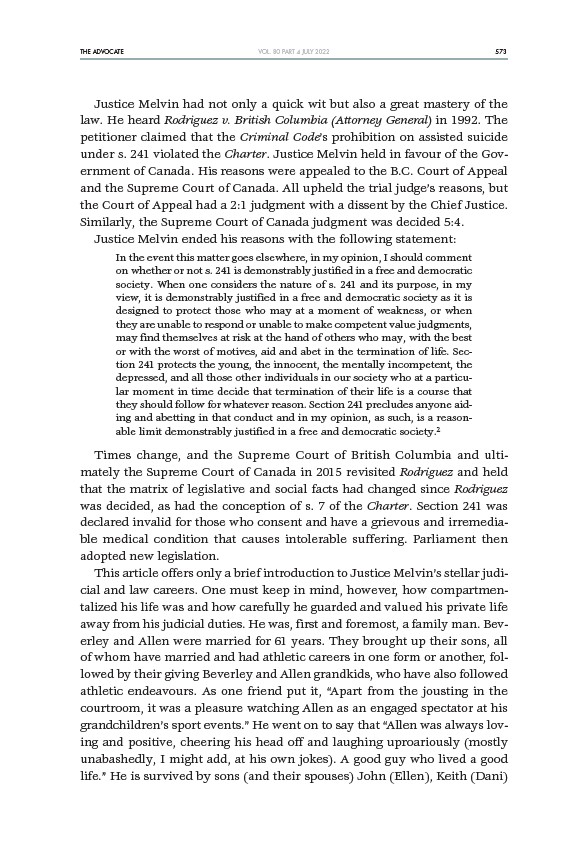
THE ADVOCATE 573
VOL. 80 PART 4 JULY 2022
Justice Melvin had not only a quick wit but also a great mastery of the
law. He heard Rodriguez v. British Columbia (Attorney General) in 1992. The
petitioner claimed that the Criminal Code’s prohibition on assisted suicide
under s. 241 violated the Charter. Justice Melvin held in favour of the Government
of Canada. His reasons were appealed to the B.C. Court of Appeal
and the Supreme Court of Canada. All upheld the trial judge’s reasons, but
the Court of Appeal had a 2:1 judgment with a dissent by the Chief Justice.
Similarly, the Supreme Court of Canada judgment was decided 5:4.
Justice Melvin ended his reasons with the following statement:
In the event this matter goes elsewhere, in my opinion, I should comment
on whether or not s. 241 is demonstrably justified in a free and democratic
society. When one considers the nature of s. 241 and its purpose, in my
view, it is demonstrably justified in a free and democratic society as it is
designed to protect those who may at a moment of weakness, or when
they are unable to respond or unable to make competent value judgments,
may find themselves at risk at the hand of others who may, with the best
or with the worst of motives, aid and abet in the termination of life. Section
241 protects the young, the innocent, the mentally incompetent, the
depressed, and all those other individuals in our society who at a particular
moment in time decide that termination of their life is a course that
they should follow for whatever reason. Section 241 precludes anyone aiding
and abetting in that conduct and in my opinion, as such, is a reasonable
limit demonstrably justified in a free and democratic society.2
Times change, and the Supreme Court of British Columbia and ultimately
the Supreme Court of Canada in 2015 revisited Rodriguez and held
that the matrix of legislative and social facts had changed since Rodriguez
was decided, as had the conception of s. 7 of the Charter. Section 241 was
declared invalid for those who consent and have a grievous and irremediable
medical condition that causes intolerable suffering. Parliament then
adopted new legislation.
This article offers only a brief introduction to Justice Melvin’s stellar judicial
and law careers. One must keep in mind, however, how compartmentalized
his life was and how carefully he guarded and valued his private life
away from his judicial duties. He was, first and foremost, a family man. Beverley
and Allen were married for 61 years. They brought up their sons, all
of whom have married and had athletic careers in one form or another, followed
by their giving Beverley and Allen grandkids, who have also followed
athletic endeavours. As one friend put it, “Apart from the jousting in the
courtroom, it was a pleasure watching Allen as an engaged spectator at his
grandchildren’s sport events.” He went on to say that “Allen was always loving
and positive, cheering his head off and laughing uproariously (mostly
unabashedly, I might add, at his own jokes). A good guy who lived a good
life.” He is survived by sons (and their spouses) John (Ellen), Keith (Dani)